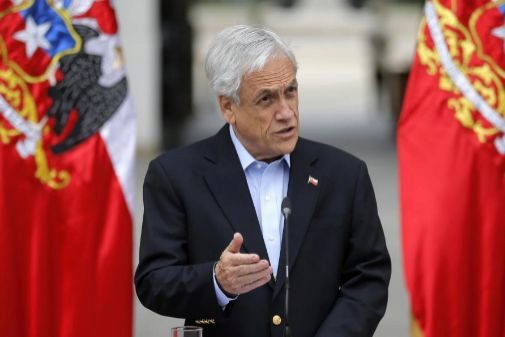- America. 1.2 million people: historical and peaceful march in Chile
- Protestas.https: //www.elmundo.es/internacional/2019/10/20/5dac93adfdddffb0578b45fe.html? Intcmp = MNOT23801 & s_kw = 1
While hundreds of Chileans gathered in downtown Santiago to clean up the dirt left by the massive demonstration on Friday, President Sebastián Piñera announced two decisions with which he seeks to recover political oxygen: he requested the resignation of all his ministers and raised from the Sunday the "state of emergency."
"I have asked all the ministers to make their positions available to be able to structure a new cabinet to be able to face these new demands and take care of the new times," said Piñera from the Palacio de La Moneda, the seat of the Chilean government.
"If circumstances permit, it is my intention to lift all states of emergency from 24 hours this Sunday." Piñera added that the intention is "to contribute to the normalization that Chileans so much love and deserve . "
The presidential announcements arrived hours after the biggest popular demonstration in the country's history. If in 1988, one million Chileans took to the streets of Santiago to say "no" to the intention of the dictator Augusto Pinochet to perpetuate himself in power, 31 years later, the march was greater: 1.2 million people took peace and almost playfully the streets of the capital to demand a different Chile from power.
The call for the march was born on social networks under the hashtag #lamarchamasgrande, and attendees arrived wearing shirts of the national football team, from different clubs or with the Chilean flag attached to the neck , which layer. The Mapuche flags also had an important presence on a day that saw Chileans march not only in Santiago, but in many other regions of the country.
Many protesters wore handkerchiefs or chinstraps, ready for the usual tear gas with which the security forces disperse the marches. The demands were diverse, from claims of the LGBTIQ collective, to banners that claimed "no more violence," "a new Constitution" or accused the military of "murderers." Piñera's resignation and the end of the AFPs were also claimed, the private pension funds that are the only alternative for Chileans in a country without a public retirement system.
Violence and deaths
Chile has been in a state of emergency since Friday 18 of this month, when what had begun as a student complaint for the increase in the subway ticket was transformed into mass demonstrations and an explosion of violence that resulted in the burning of several Metro stations and the use of most of the network, as well as looting. Nineteen people died and hundreds were injured . Allegations of executions by security forces, torture and sexual abuse are investigated.
Overcome by the popular wave and strongly criticized for saying that the country was "at war", Piñera asked for "forgiveness" for his "lack of vision" and announced several measures of economic relief that much of the political arc considers "insufficient."
"We have all heard the message, we have all changed. Now, we have to join forces to give true, urgent and responsible responses to those social demands of all those Chileans," Piñera said in announcing his intention to have a new government team. In turn, he emphasized his intention to "start next week with full institutional and citizen normality".
According to the criteria of The Trust Project
Know more- Chile
- America
ChileSebastián Piñera says that Chile "is at war" while there are already 11 dead in the protests
Latin America1.2 million people: historic and peaceful march in Chile
Crisis Protests in Chile leave 15 people dead while Piñera proposes a "social agreement"

